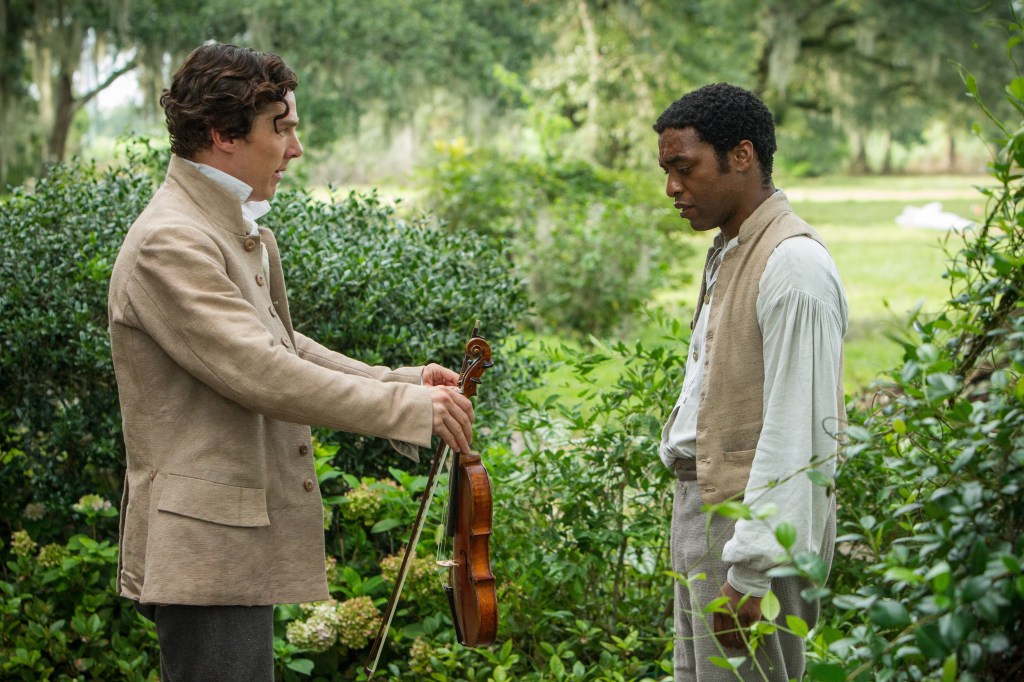We expect the lashings, the leg irons, the cruelty and injustice of it all. But what Steve McQueen’s brilliant “12 Years a Slave” does for our understanding of that “peculiar” institution is to depict the utter hopelessness of those enslaved.
It lets a smartphone-addicted generation understand what it was like to not know where you are, to realize the helplessness of attempting to run away.
And it forces those who would rationalize the era’s mores and religious “justification” for human beings enslaving and torturing one another to see that there is no rationalization for it, that there were many who could tell right from wrong, even back then.
Chiwetel Ejiofor conjures up just the right measure of dignity and refinement as Solomon Northup, a New York musician, husband and father who was tricked into taking an engagement in Washington, along the border between free and slave states.
Yes, this really happened in 1841: A black American who had never been a slave was kidnapped, smuggled south and sold into slavery. He struggled to keep his spirits up and his hope alive, even as others around him committed suicide or fell into inconsolable weeping at having their children sold away from them.
The beauty of this movie is in how we identify with Northup and come to understand the awful effects his loss of liberty had not just on him, but on the moral relativists and outright sadists who ran the machinery of slavery.
Even a so-called “good master” (the terrific Benedict Cumberbatch plays one) had to embrace an “it’s just business” myopia about what he was doing to other human beings. And a “legitimate businessman” (Paul Giamatti) had to close his eyes to the unspeakable cruelty of breaking up families, to become less human by treating other humans as livestock.
And then there were the monsters. Paul Dano is hateful perfection as the classic low-class overseer, brutal to his charges because he needs someone to look down on and lord over. A wild-eyed Michael Fassbender plays an alcoholic Louisiana landowner who keeps an enslaved paramour (Lupita Nyong’o, a revelation) whom his resentful wife (Sarah Paulson) insists on forcing her husband to torture in his sober moments.
And Alfre Woodard plays a onetime slave who has become mistress of her house, not above keeping slaves of her own, but capable of empathy and kindness toward those still confined.
Ejiofor keeps Northup’s emotions close to the vest as he endures the unendurable – hard labor, from cotton picking to cane harvesting – and harder punishment.
Northup’s music is one way he clings to his humanity, but even that isn’t enough. Ejiofor (“Kinky Boots”) never lets us see hate or fear in the man’s eyes, only resignation broken by slivers of hope that he might somehow escape this hell.
It’s a challenging, serious and scholarly film, not the blaxploitation burlesque that was “Django Unchained.” McQueen (“Shame,” “Hunger”) and his stellar cast take us on a difficult journey, a sometimes awful and only faintly inspiring odyssey that will make you want to avert your eyes. It is to their great credit that we never do.
Copy the Story LinkSend questions/comments to the editors.



Success. Please wait for the page to reload. If the page does not reload within 5 seconds, please refresh the page.
Enter your email and password to access comments.
Hi, to comment on stories you must . This profile is in addition to your subscription and website login.
Already have a commenting profile? .
Invalid username/password.
Please check your email to confirm and complete your registration.
Only subscribers are eligible to post comments. Please subscribe or login first for digital access. Here’s why.
Use the form below to reset your password. When you've submitted your account email, we will send an email with a reset code.